
Ottoman Armenian casualties refers to the number of deaths of Ottoman Armenians between 1914 and 1923, during which the Armenian genocide occurred. Most estimates of related Armenian deaths between 1915 and 1918 range from 600,000 to 1.5 million.
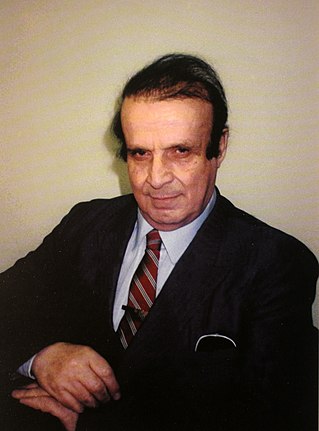
Vahakn Norair Dadrian was an Armenian-American sociologist and historian, born in Turkey, professor of sociology, historian, and an expert on the Armenian genocide.
The Ottoman archives are a collection of historical sources related to the Ottoman Empire and a total of 39 nations whose territories one time or the other were part of this Empire, including 19 nations in the Middle East, 11 in the EU and Balkans, three in the Caucasus, two in Central Asia, Cyprus, as well as the Republic of Turkey.

Armenian genocide denial is the negationist claim that the Ottoman Empire and its ruling party, the Committee of Union and Progress (CUP), did not commit genocide against its Armenian citizens during World War I—a crime documented in a large body of evidence and affirmed by the vast majority of scholars. The perpetrators denied the genocide as they carried it out, claiming that Armenians in the Ottoman Empire were resettled for military reasons, not exterminated. In its aftermath, incriminating documents were systematically destroyed. Denial has been the policy of every government of the Ottoman Empire's successor state, the Republic of Turkey, as of 2024.

Screamers is a 2006 documentary film directed by Carla Garapedian, conceived by Peter McAlevey and Garapedian and produced by McAlevey. The film explores why genocides have occurred in modern day history and features talks from Serj Tankian, lead vocalist of the American alternative metal band System of a Down, whose grandfather is an Armenian genocide survivor, as well as from human-rights activist, journalist, and professor, Samantha Power, as well as various other people involved with genocides in Rwanda and Darfur. Screamers also examines genocide denial in current-day Turkey, and the neutral trend that the United States generally holds towards genocide.

Ara Sarafian is a British historian of Armenian origin. He is the founding director of the Gomidas Institute in London, which sponsors and carries out research and publishes books on modern Armenian and regional studies.

The Remaining Documents of Talaat Pasha, also known in Turkey as The Abandoned Documents of Talaat Pasha and Talaat Pasha's Black Book, is the title of a 2008 book by the Turkish journalist Murat Bardakçı. It reproduces in modern Turkish script a selection of documents from the WWI period by Mehmed Talaat Pasha, the Ottoman Empire's Grand Vizier and Minister of Interior, that deal with the relocations of both Muslim Turks and Armenians and the expropriation of abandoned Armenian and Greek property. Its full English title is The Remaining Documents of Talaat Pasha: Documents and Important Correspondence Found in the Private Archives of Sadrazam Talaat Pasha about the Armenian Deportations.
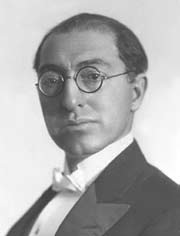
Tevfik Rüştü Aras was a Turkish politician, serving as deputy and foreign minister of Turkey during the Atatürk era (1923–1938).

Ambassador Morgenthau's Story (1918) is the title of the published memoirs of Henry Morgenthau Sr., U.S. Ambassador to the Ottoman Empire from 1913 to 1916, until the day of his resignation from the post. The book was dedicated to the then U.S. President Woodrow Wilson, and it took over two years to complete. The ghostwriter for Henry Morgenthau was Burton J. Hendrick; however, a comparison with official documents filed by Morgenthau in his role as ambassador shows that the book must have been structured and written extensively by Morgenthau himself.
Heath Ward Lowry is the Atatürk Professor of Ottoman and Modern Turkish Studies emeritus at Princeton University and Bahçeşehir University. He is an author of books about the history of the Ottoman Empire and Modern Turkey.

The Blue Book, officially titled The Treatment of Armenians in the Ottoman Empire 1915-1916, was an official report commissioned by the British Parliament and presented in 1916 by Viscount Bryce and Arnold J. Toynbee. The 742-page volume is a compilation of over 100 sources that chronicled the early period of the Armenian genocide and the Assyrian genocide in the Ottoman Empire.
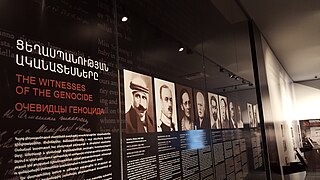
Witnesses and testimony provide an important and valuable insight into the events which occurred both during and after the Armenian genocide. The Armenian genocide was prepared and carried out by the Ottoman government in 1915 as well as in the following years. As a result of the genocide, as many as 1.5 million Armenians who were living in their ancestral homeland were deported and murdered.
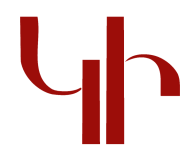
The Gomidas Institute is an independent academic institution "dedicated to modern Armenian and regional studies." Its activities include research, publications and educational programmes. It publishes documents, monographs, memoirs and other works on modern Armenian history and organizes lectures and conferences. The institute was founded in 1992 at the University of Michigan in Ann Arbor. It is based in London and maintains a United States branch in Cleveland. British-Armenian historian Ara Sarafian serves as its executive director. Since 1998, the institute has been publishing a quarterly journal titled Armenian Forum. The institute is named after Komitas.

1915 is a 2015 American psychological thriller film written and directed by Garin Hovannisian and Alec Mouhibian. The film stars Simon Abkarian, Angela Sarafyan, Nikolai Kinski, Debra Christofferson, Jim Piddock, and Samuel Page. It follows a mysterious director staging a play to bring the ghosts of a forgotten tragedy back to life on the 100th anniversary of the Armenian genocide.

The Promise is a 2016 American epic historical war drama film directed by Terry George, from a screenplay he co-wrote with Robin Swicord. Set in the final years of the Ottoman Empire, the film stars Oscar Isaac, Charlotte Le Bon and Christian Bale. The plot is about a love triangle that develops between Mikael (Isaac), an Armenian medical student, Chris (Bale), an American journalist, and Ana, an Armenian-born woman raised in France, immediately before and during the Armenian genocide.
Ottoman studies is an interdisciplinary branch of the humanities that addresses the history, culture, costumes, religion, art, such as literature and music, science, economy, and politics of the Ottoman Empire. It is a sub-category of Oriental studies and Middle Eastern studies, and also Turkish studies.

Aghperig monastery, also known as Beyaz Kilise, is a medieval Armenian monastic complex in the Sasun Mountains of eastern Turkey. It is located 56 kilometres West of Lake Van in the north of the Sassun mountains in the Sason district in the province of Bitlis. The monastery was built above a natural spring from where it gets its name Sourp Aghperig.
100 Years Later is a 2016 British documentary film directed, written, and produced by John Lubbock. The film follows the work of historian Ara Sarafian, executive director of the Gomidas Institute in London, in his efforts to create dialogue in Turkey among Armenians, Kurds, and Turks on the occasion of the 100th anniversary of the Armenian genocide on 24 April 2015. The film includes appearances by Selahattin Demirtaş and İsmail Beşikçi.
Bibliography of the Armenian genocide is a list of books about the Armenian genocide:
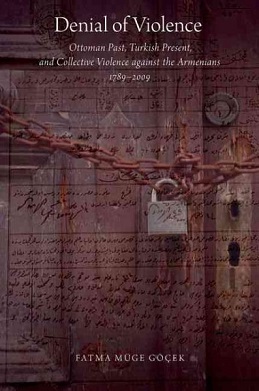
Denial of Violence: Ottoman Past, Turkish Present and Collective Violence Against the Armenians, 1789–2009 is a 2015 book by Turkish sociologist Fatma Müge Göçek which deals with the denial, justification, and rationalization of state-sponsored violence against Armenians in the Ottoman Empire and Turkey from the eighteenth to the twenty-first century, focusing especially on the Armenian genocide and its persistent denial in Turkey. Among the arguments made in the book is that the Armenian genocide was an act of foundational violence that enabled the creation of the Republic of Turkey and its continuing denial is an ideological foundation of the Turkish nation-state. The book was praised by reviewers for its extensive research and methodological innovation, although some noted that it was dense and not easy to read for those not familiar with the topic.














